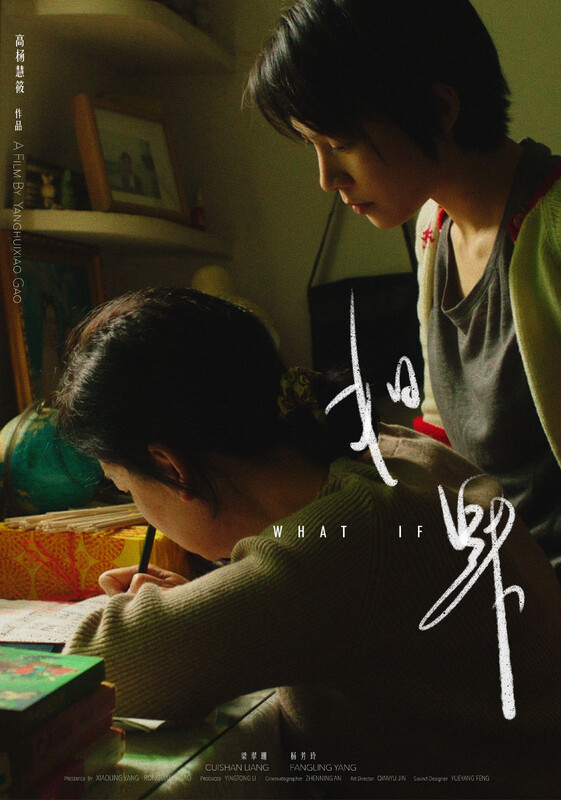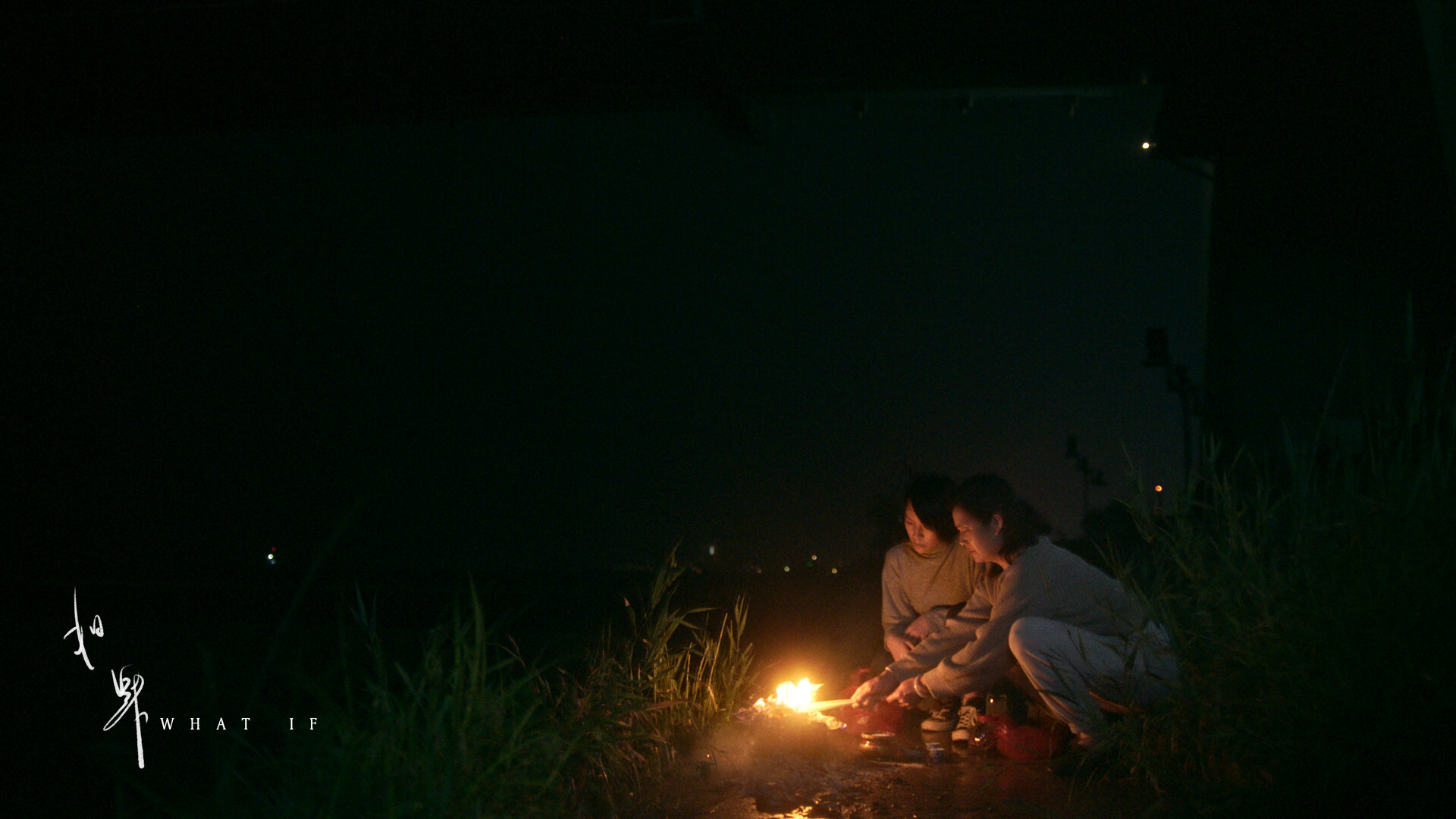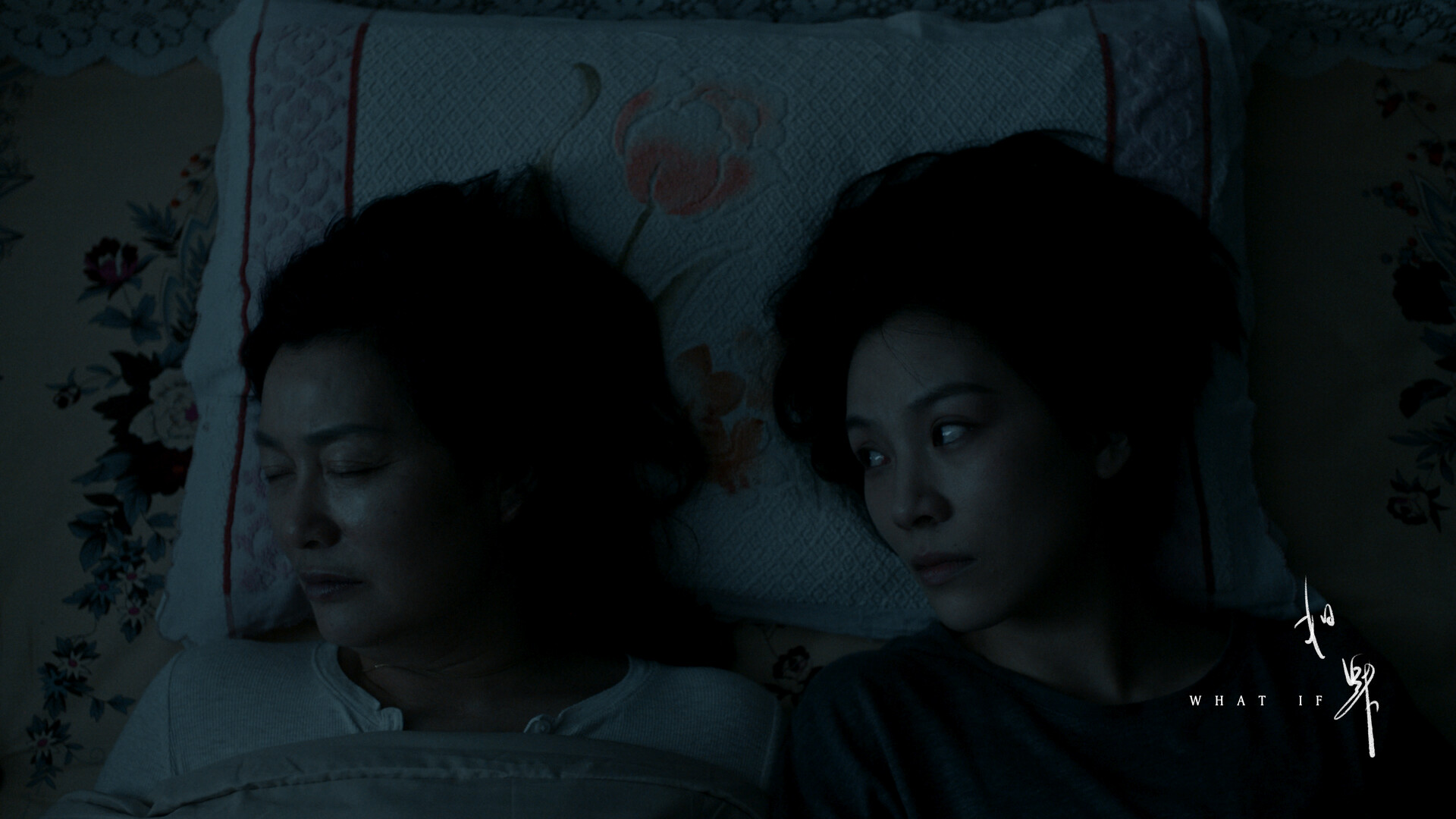Interview with Yanghuixiao Gao
Yanghuixiao Gao (Gaoyang), an independent filmmaker based in the United States, holds a Master's Degree in Film and Media Art from Emerson College. Her cinematic endeavors delve into themes of personal growth with a universal resonance and a distinctly feminine sensibility.
Her latest narrative short film, "What If," has garnered acclaim, earning official selection status at the Oscar-Qualifying HollyShorts Film Festival and BIFA qualifying Directors Notes. Additionally, it stands as a Semi-Finalist at the Flickers' Rhode Island International Film Festival and has been shortlisted by the Short Shorts Film Festival & Asia.
Gaoyang's previous works have also received notable recognition, including accolades from the Asian Film Festival, Seattle Asian American Film Festival, Hollywood New Directors, LA Documentary Film Festival, New York City Independent Film Festival
Could you briefly describe your project for our audience?
"What If", set in modern China, is a short Family Drama that deals with women's reproductive health: After knowing that a recurrent gynecological disease she has might deprive her of fertility, YILIN, a young Chinese woman confronts a sore point between her and her mother during a special visit back home.
Her latest narrative short film, "What If," has garnered acclaim, earning official selection status at the Oscar-Qualifying HollyShorts Film Festival and BIFA qualifying Directors Notes. Additionally, it stands as a Semi-Finalist at the Flickers' Rhode Island International Film Festival and has been shortlisted by the Short Shorts Film Festival & Asia.
Gaoyang's previous works have also received notable recognition, including accolades from the Asian Film Festival, Seattle Asian American Film Festival, Hollywood New Directors, LA Documentary Film Festival, New York City Independent Film Festival
Could you briefly describe your project for our audience?
"What If", set in modern China, is a short Family Drama that deals with women's reproductive health: After knowing that a recurrent gynecological disease she has might deprive her of fertility, YILIN, a young Chinese woman confronts a sore point between her and her mother during a special visit back home.

What were your main aspirations or goals when creating this project?
I was initially inspired by a personal revelation: there always exists a hidden timeline dictating when the 'right' moment for a woman to become a mother is. It was during this period that I opted to study abroad in pursuit of my filmmaking dreams. However, when my grandpa passed away amid the pandemic, I found myself unable to be present for my mother and family, and it shattered my heart. The uncertainty surrounding my future coupled with overwhelming nostalgic emotions culminated in the creation of this film.
On top of that, with an increasing number of films drawing attention to abortion, there are hardly any movies discussing women's reproductive health and its impact on their physical and mental well-being. I aim to invite the audience to glimpse into how fertility shapes a woman's life and influences those around her from a distinct perspective through my short film.
With this film, I want to thank my mother, who might not understand but is always there for me. And I want to send my love to all the women, who understand what it's like to suffer from the pain and the fear.


Share some memorable moments from the shooting process or any pleasant surprises.
Amidst the backdrop of the pandemic, shooting in my hometown of Jiujiang, China, presented numerous logistical hurdles due to lockdowns affecting travel and crew availability. Despite these challenges, we persevered, assembling a team primarily comprised of individuals from out of town, along with necessary equipment.
Fortunately, the majority of our crew managed to overcome these obstacles and join us on set. I remain deeply appreciative of their willingness to take risks and contribute to the project. Throughout the shoot, bonds formed among us, evolving into lasting friendships—a heartening aspect of the experience.
Jiujiang's culinary delights added an extra layer of enjoyment to our time on set. We took pride in treating the crew to an array of delicious, locally sourced spicy dishes, curated by myself and the local producer. It was rewarding to see everyone relish the flavors of our hometown cuisine.
Following the wrap-up, while some crew members had to depart immediately, a few stayed behind, affording me the opportunity to share more of Jiujiang's charms. A short excursion to Mountain Lu provided not only scenic vistas but also a chance to savor additional culinary delights unique to the region.
Above all, ensuring that everyone involved had a positive and enjoyable experience was paramount to me. Seeing the crew come together, overcome challenges, and depart with fond memories made the entire journey immensely fulfilling.
Who is the primary target audience for your film, and what do you hope they will take away from it?
Our film is crafted with a broad audience in mind. This film isn't just about women's health issues; it's about family, love, and the complexities of human experience. It's a film for anyone who has a family and wants to gain insight into the nuances of reproductive health and its impact on ones lives.
I'm hoping to create an opportunity to delve into the often overlooked topic of women's reproductive health and its profound effects on their lives. While many films focus on abortion, we're offering a unique perspective that explores an aspect of a woman's reproductive journey, and how it reverberates through her relationships and the lives of those around her.
What makes your project an appealing choice for potential distributors?
Our film delves into the often-overlooked topic of women's reproductive health, offering a fresh and original perspective that has resonated with audiences worldwide. Throughout its festival run, it has received widespread acclaim, being selected by Academy Award, GOYA, and BIFA qualifying festivals like the HollyShorts Film Festival, and Directors Notes. These accolades highlight the film's ability to spark meaningful conversations while pushing boundaries in storytelling. From its wins at the Spello International Film Festival to its recognition at festivals like Short Shorts Film Festival & Asia, our film continues to captivate audiences and affirm its position as a groundbreaking work of cinematic artistry.
How would you define your unique filmmaking style, and what distinct qualities characterize your film?
In my multifaceted role as a director, producer, writer, and cinematographer, I specialize in crafting narratives that delve into the subtleties of the human experience, particularly from a female perspective. My work is defined by its focus on personal growth and struggle, themes that resonate
I am known for my ability to direct and produce stories that are both authentic and nuanced, with characters that feel real and relatable. Whether I'm exploring "what if" scenarios or delving into the depths of personal struggle, I aim to create narratives that touch the hearts of audiences and leave a lasting impression.
What I am most proud of in my work is the authenticity and warmth that I strive to imbue into every project. I approach each endeavor with dedication and passion, always seeking to be an active problem-solver and ensure that every aspect of the production is meticulously executed.
What sets me apart from others in my field is my keen observational skills as a filmmaker. I draw inspiration from the world around me, paying close attention to the nuances of daily life and the people I encounter. This attention to detail allows me to infuse my stories and characters with authentic elements that resonate deeply with audiences.
What inspired you to pursue a career in filmmaking?
My journey into the world of storytelling commenced in China, where I grew up and pursued studies in digital media art. It was during this period that I encountered a profoundly transformative Japanese film titled 'Memories of Matsuko,' directed by Tetsuya Nakashima. This cinematic experience served as a powerful awakening, igniting within me a deep-seated passion for storytelling's capacity to illuminate the human experience and inspire positive change.
Growing up in China, there was a prevailing expectation, particularly for women, to subsume their own identities in service to others. This societal pressure to prioritize the needs of others over one's individuality led to a disconnect within myself that I didn't fully recognize until encountering 'Memories of Matsuko.' Through the lens of this film, I saw reflected a version of myself that had been obscured—a realization that sparked a journey of self-discovery and personal growth.
I delved into writing and directing as avenues for self-expression and exploration. Developing stories and characters became not only a creative pursuit but also a means of deeper understanding—of myself, of others, and of the world at large. This journey was marked by moments of struggle, anger, understanding, acceptance, and ultimately, a commitment to embracing my authentic self.
For women, especially those who have long been suppressed or marginalized, the journey to self-realization requires immense courage and effort. It involves breaking free from societal constraints, finding one's voice, and daring to be seen and heard in a world that often seeks to silence or diminish individuality. My own journey has imbued me with a profound desire to share my experiences with others through storytelling, in the hope of inspiring similar journeys of self-discovery and empowerment.
Now, as a filmmaker, I am committed to sharing my journey with the world through storytelling. My aim is to inspire others to embark on their own paths of self-discovery and empowerment, much like 'Memories of Matsuko' did for me.
Do you have a filmmaker or source of inspiration who has influenced your work?
Most recently, I have been greatly influenced by the works of Edward Yang and Céline Sciamma.
Edward Yang's intricate storytelling and his ability to portray the complexities of human relationships in films like "Yi Yi" and "Mahjong" have had a profound impact on my approach to filmmaking. His attention to detail and his exploration of everyday life inspire me to infuse my own narratives with depth and authenticity.
Céline Sciamma's body of work, including "Portrait of a Lady on Fire" and "Petite Maman," profoundly influences my approach to filmmaking. Her exploration of themes centered around women, identity, and relationships resonates deeply with me. Through her films, Sciamma delves into the complexities of female experiences with sensitivity and depth, inspiring me to craft narratives that capture the essence of women's lives with authenticity and empathy.
I'm particularly drawn to the subtlety present in both of their works, as they masterfully employ the "Show, don't tell" approach. I trust the authenticity, and honesty in my films and allow the audience to decide what their takeaways are from my works.
Share a couple of your favorite films and what resonates with you about them.
My favorite films are those that delve deep into humanity, offering unique perspectives that challenge and enrich my understanding of the world and its people.
One film that has had a profound impact on me is "Memories of Matsuko" by Tetsuya Nakashima. It's not an exaggeration to say that this film was life-changing for me, as mentioned before. It is a wake-up call for us, inspiring me to pursue filmmaking with the same level of emotional depth and power that it embodies. The film's exploration of the complexities of life, its themes of redemption, and its visually stunning storytelling continue to resonate with me deeply.
Another favorite of mine is "Petite Maman" by Céline Sciamma. This simple yet beautiful story of three women from three generations struck a chord with me, especially as it shares similarities with my short film, "What If," which also revolves around three women from different generations. I admire Sciamma's portrayal of characters and her ability to capture the subtleties of human relationships with such authenticity and grace. "Petite Maman" embodies the kind of storytelling that I aspire to create – heartfelt, genuine, and deeply resonant.
Where do you typically find inspiration for your film projects?
My inspiration for film projects primarily stems from my daily life experiences. Whether I'm writing or directing, I draw from the moments and people around me. Even when working with a script I didn't write, I find inspiration in everyday encounters and interactions, integrating them into the narrative to enrich the story's authenticity.
Additionally, I'm inspired by other films and topics related to the themes I'm exploring. Watching works by peer filmmakers and engaging in discussions with writer and filmmaker friends also fuels my creativity and helps me refine my vision for each project. Ultimately, it's this blend of personal experiences, exposure to different perspectives, and collaboration that drives my creative process and shapes the stories I bring to life on screen.
Learn more at
Website: https://www.gaoyangfilms.com/
Instagram: https://www.instagram.com/gaoyang_gy_/

